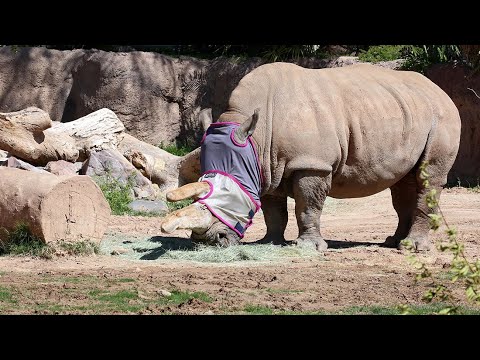– Celebrating Yebonga, the Southern White Rhino’s 51st Birthday at Reid Park Zoo
– The Role of Zoos in Wildlife Conservation and Education
– The Biology and Conservation Status of the Southern White Rhino
– Innovative Strategies in Zoo Management for Enhancing Animal Welfare
Celebrating the notable 51st birthday of Yebonga, the Southern White Rhino at Reid Park Zoo, highlights not just a milestone for the zoo but also underscores the broader conservation success story of the Southern White Rhino species. Yebonga’s longevity and health are a testament to the progressive management and care practices of zoological institutions today. This article delves into the significance of such celebrations, the pivotal role of zoos in conservation and education efforts, the biology and conservation status of Yebonga’s species, and the innovative strategies in zoo management that contribute to the welfare of animals in captivity.
Yebonga’s 51st birthday is more than a celebration of age; it’s an educational opportunity and a beacon of hope for species conservation. Born in the wild and later finding a home at Reid Park Zoo, Yebonga represents a bridge between wild populations and those in managed care. Her story offers valuable insights into the natural history of her species, the immense challenges they face in the wild from poaching and habitat loss, and the intricate care provided by zoos to ensure their health, well-being, and, in many cases, survival.
Zoos play a critical role in wildlife conservation, acting as arks of hope for many endangered species. They are not simply places to view animals but serve as centers for conservation science, education, and advocacy. The efforts to save threatened species like the Southern White Rhino from extinction involve a combination of in-situ (in the wild) and ex-situ (in captivity) strategies. Zoos fund and support field conservation projects, participate in breeding programs to maintain genetic diversity and educate the public about conservation issues. Yebonga’s presence at Reid Park Zoo embodies the educational and conservation mission that modern zoological parks stand for.
The Southern White Rhino, scientifically known as Ceratotherium simum simum, has been the focus of intense conservation efforts over the last few decades. Once on the brink of extinction, with fewer than 100 individuals in the wild at the beginning of the 20th century, the species has been brought back from the verge through diligent protection and management. However, despite these efforts, threats still loom large due to habitat loss and the constant menace of poaching for their horns. Understanding the biological aspects of Southern White Rhinos, including their social structure, diet, and reproductive biology, is crucial for their ongoing conservation and management in both wild and captive settings.
Innovative strategies in zoo management have significantly advanced in recent years, enhancing the welfare of animals like Yebonga in human care. These strategies involve creating naturalistic habitats, implementing enrichment programs that stimulate natural behaviors, and adopting non-invasive monitoring techniques to assess health and well-being. The understanding and application of animal behavior and welfare science are central to these efforts, ensuring that animals in zoos lead enriched, healthy lives. Moreover, zoos have evolved to participate actively in global conservation efforts, contributing to the protection of habitats and species’ survival across the planet.
In celebrating Yebonga, the Southern White Rhino’s 51st birthday at Reid Park Zoo, we recognize not just a significant life but a broader narrative of conservation, education, and the evolving role of zoos in the modern world. This event is a powerful educational tool, raising awareness about the status of rhinos in the wild, the challenges they continue to face, and the concerted efforts required to ensure their future. By supporting zoos like Reid Park Zoo, the public can play a part in this global conservation effort, contributing to a future where species such as the Southern White Rhino thrive in the wild and human care.
*****
Source Description
Yebonga, the southern white rhino, is 51 years young! 🦏 Yebonga enjoys her routines in these golden years of her life.
Each day she eats her breakfast, receives her morning check with her care team, and then heads to a soft sandy spot for a nice long nap.
Yebonga is among the oldest in her species survival plan, with the median life expectancy for southern white rhinos being in the mid 30s.

